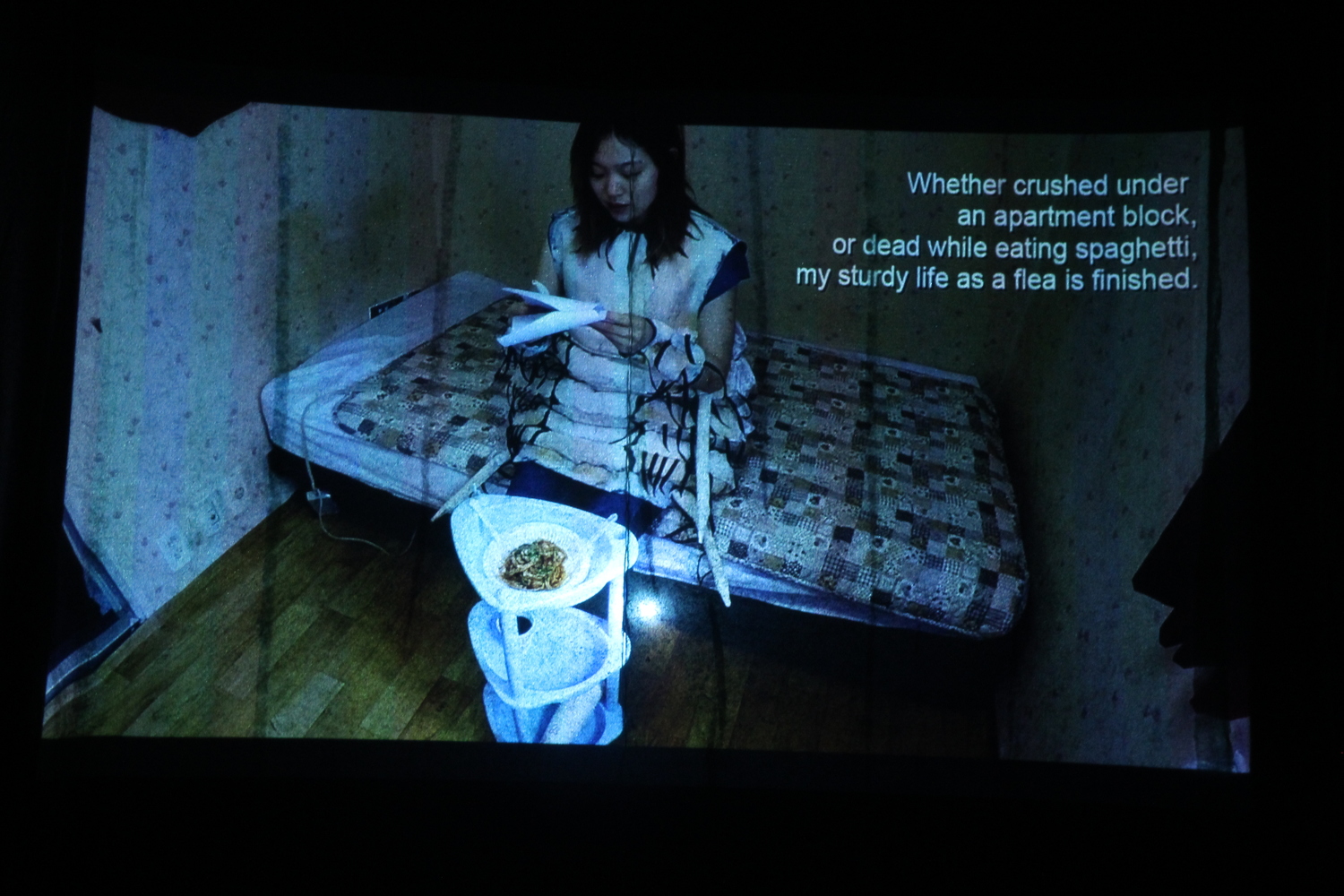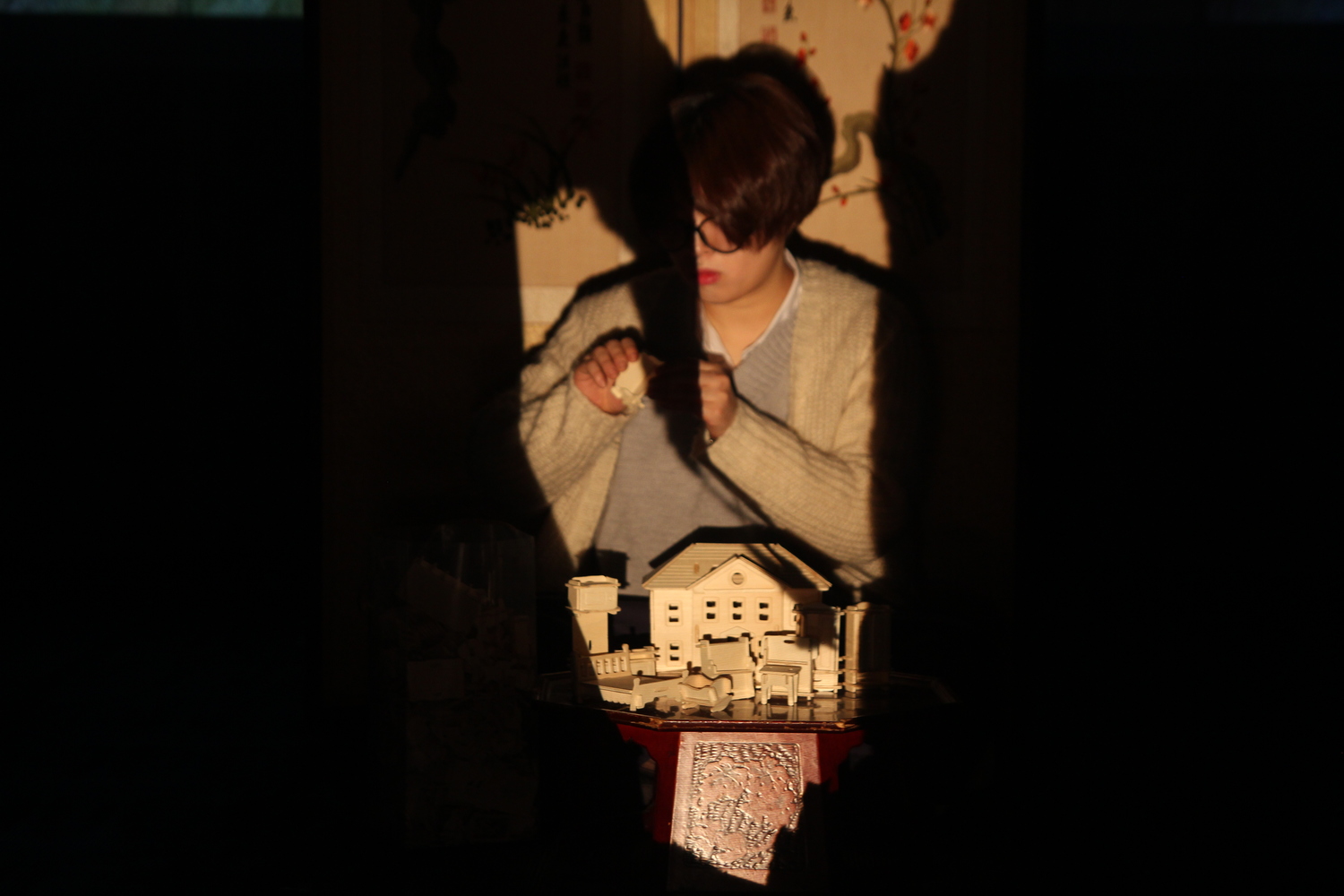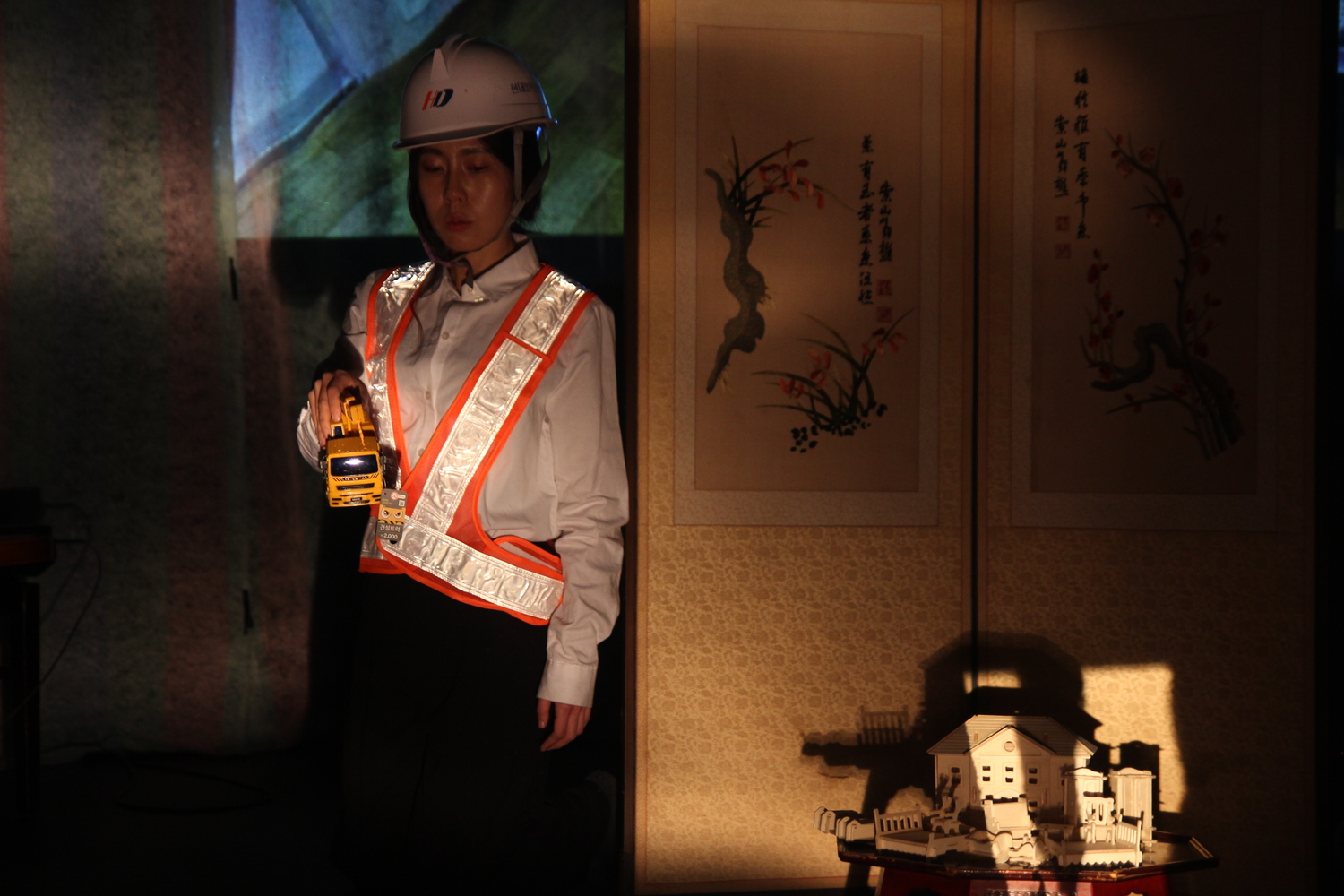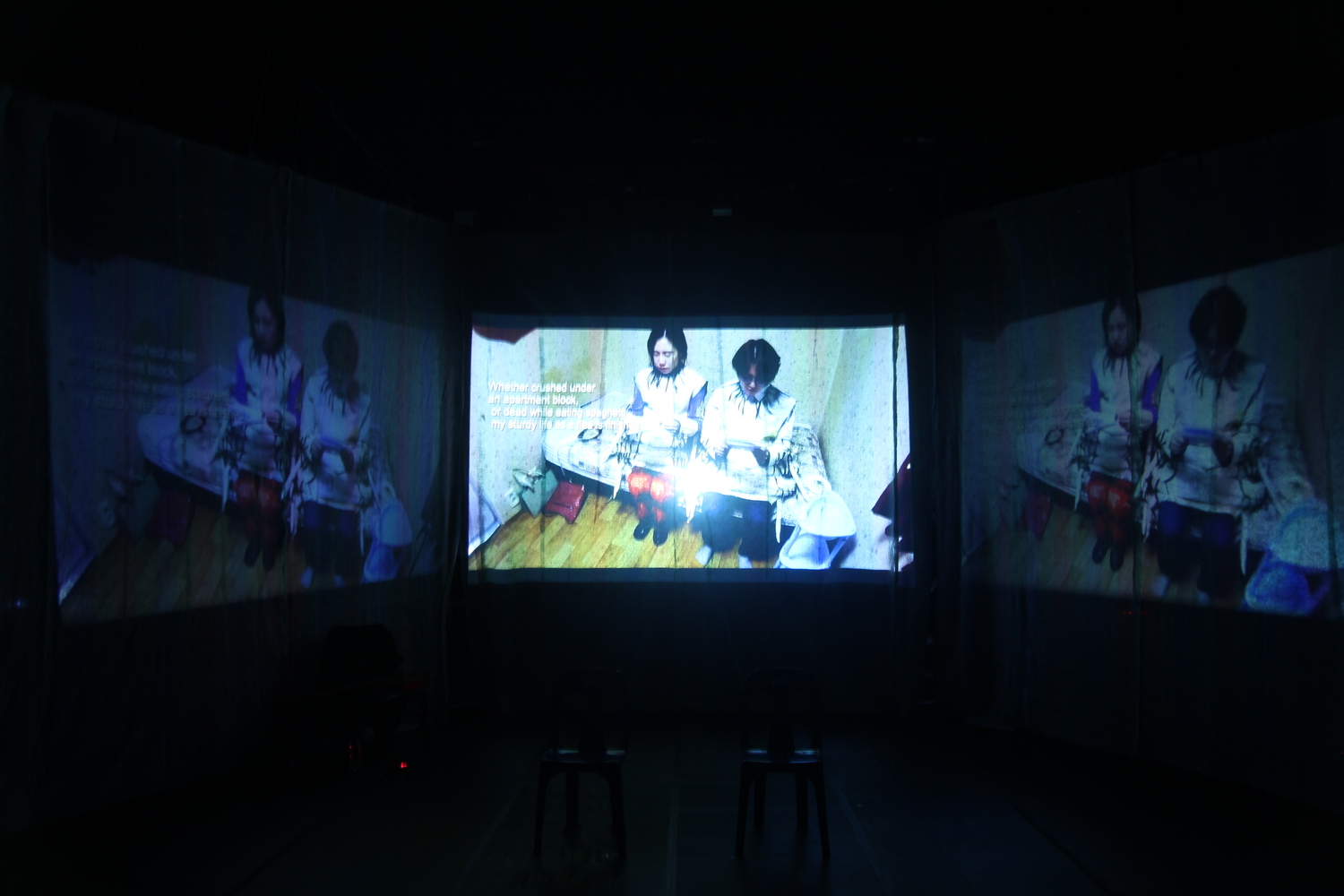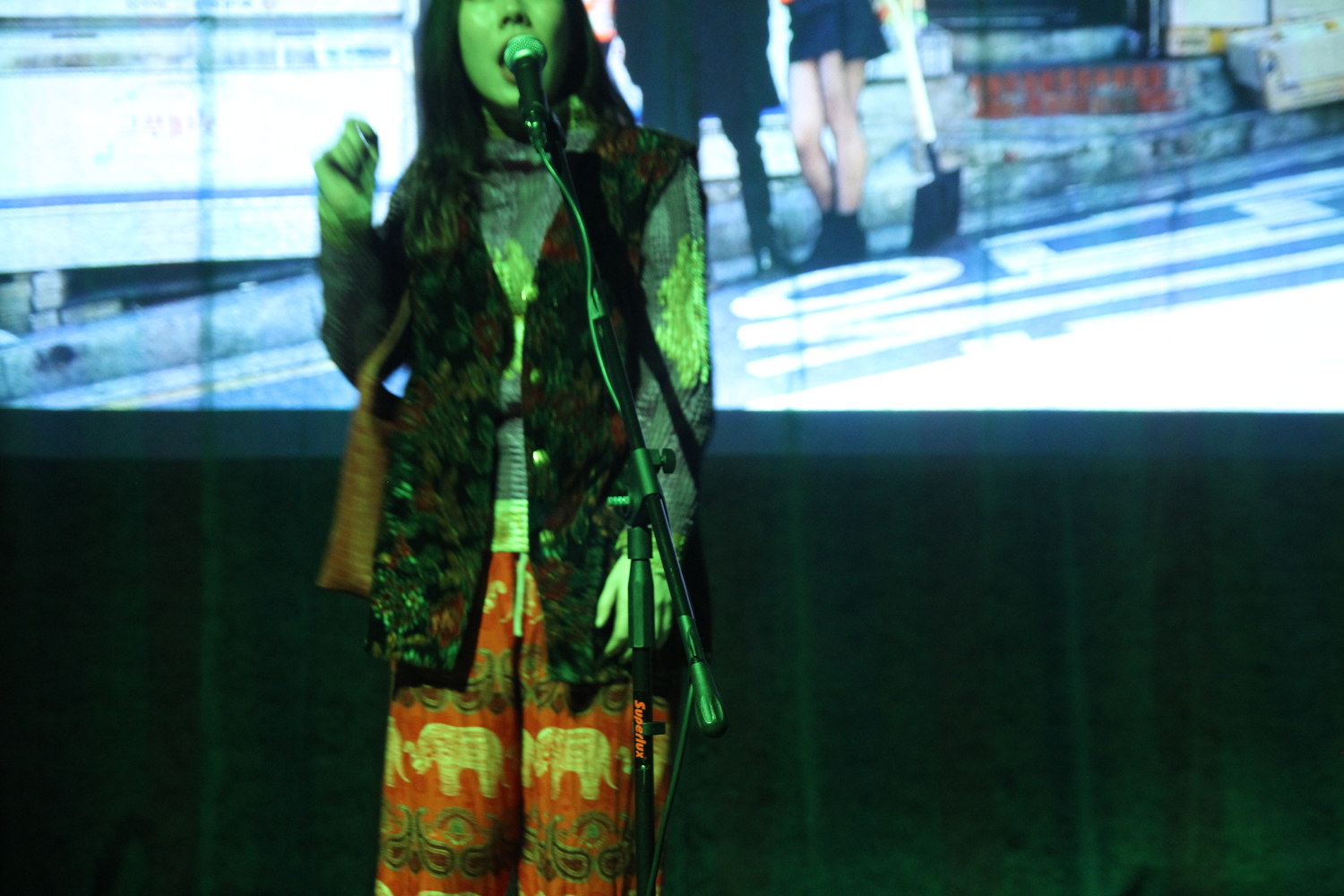Miss Flea of Inn Goobon
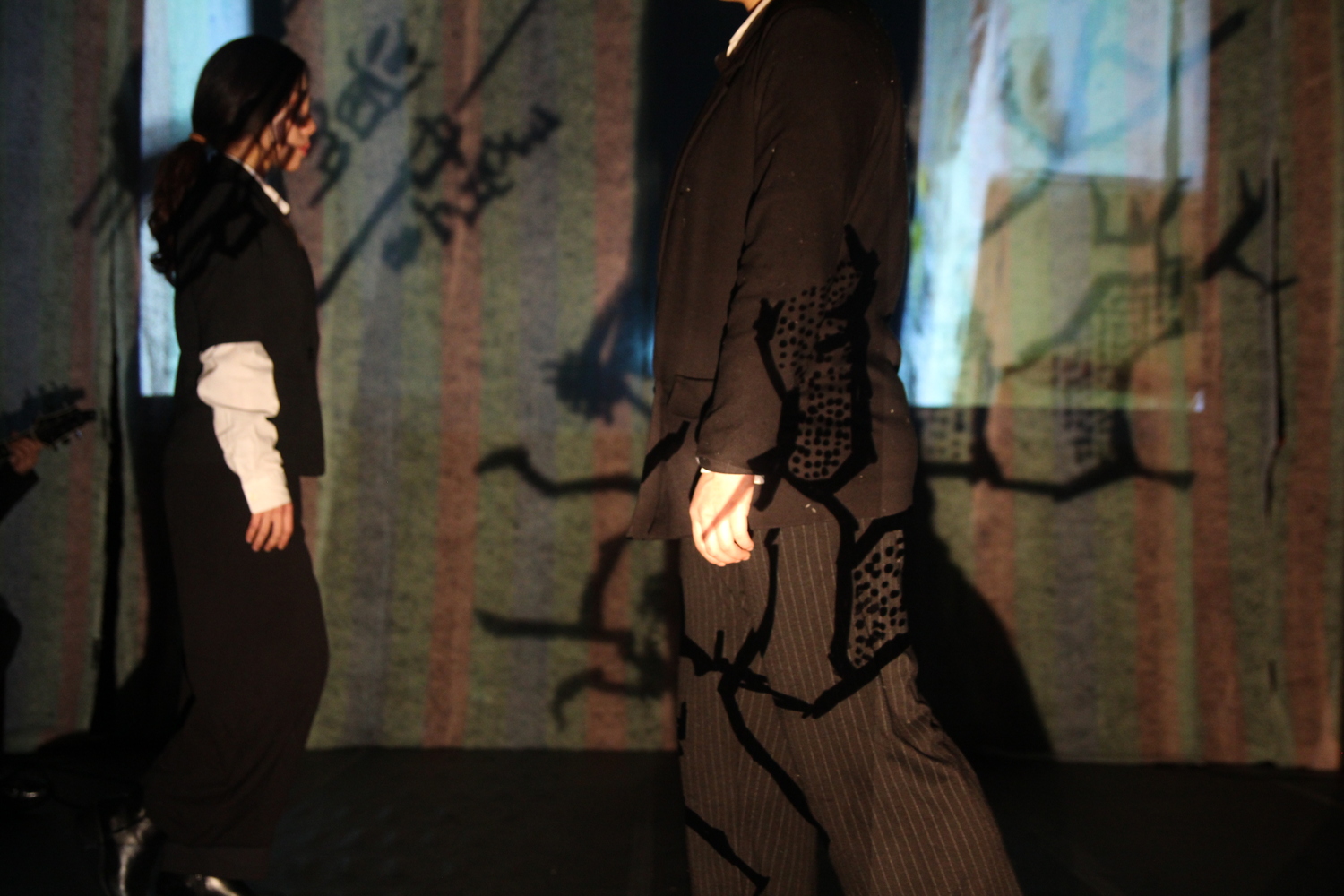
2016 / Scenography and Graphic design as MARC Factory
04/2016, Miss Flea of Inn Goobon, a devised performance with media, presented as part of conference “Art without borders” and Festival Bo:m, Kyung gi University, Media Art Research Centre, Seoul, South Korea
DIRECTOR’S
NOTE
1. Humankind has the right to own one’s memory and declare its ownership.
2. In capitalist society, civilised people’s lives reduce to food-porn or apartment complex.
3. Inequality creates endless severance for certain people.
4. When the world is collapsing rapidly, what should theatre do as a medium to bear reality?
5. Human abilities to imagine or memorise is finite. Only fleas remember everything.
This performance is about a vanishing space.
To elaborate, this performance is about a space soon to be demolished and diminished as a result of a government redevelopment scheme. Through this performance, we wish to transparently reveal our perspective on various people observing the disappearance of the space; of the social background where the street ‘Okbaraji (meaning the act of providing attentive care for prisoners from outside of the prison) has to be vanished; and of the citizens left in this vertiginous environment to protect their space.
When we first encountered the street Okbaraji, we were expecting to trace back the historical data of people who had rooted themselves on the street, making sacrifices for the independent activists or the democratisation movement, supporting with material and mind. However, when we had actually confronted the street, we could not argue against the fact that it would be meaningless to make a performance about ‘memories’ if we do not discuss the more fundamental and realistic problems of the space. After it had been designated as a ‘redevelopment area,’ half of the residents had already packed their belongings. Searching for historical memories of the street by interviewing guests who soon had to end their stay at the temporary residences in the ‘inns’ seemed not only difficult, but also shameful - to thrust microphones to residents whose habitat rights were threatened.
Street Okbaraji is the space which ‘exists outside of the frame’. If the inside of the frame represents the so-called historical ‘mainstream’, what are endlessly excluded from the history are left outside of the frame, outcrying silently, backing up the mainstream. This street has been excluded from the mainstream economy, also from the Seoul Fortress Wall. Likewise, it is also a space of women who had devoted their lives to look after the prisoners which has not been illuminated, compared to those from the Seodaemun Prison, positioned inside of the frame. This space outside of the frame, the structure of standing aside from the mainstream is inherited. It is the current state that the voices of residents from this street have never been heard attentively, buried under the capital principles of urban redevelopment.
There will be apartment complex soon to be built on the street Okbaraji, and the construction process has already begun. Space is memory. A will to live in a space is a tenacity to remember something. And these tenacities when accumulated without ruptures, will give a space a possibility to become a memory and to be self-explanatory.
1. 인간은 기억을 소유하고 그 소유권을 주장할 권리가 있다.
2. 자본주의에서 문명인의 삶은 먹방이나, 아파트로 요약된다.
3. 불평등은 어떤 사람들의 삶을 끊임없는 단절로 만든다.
4. 세상이 빠른 속도로 무너질 때 세상을 담아야 하는 연극은 어떻게 해야 하는가.
5. 인간의 상상력과 기억력은 유한하다. 벼룩만이 모든 것을 기억한다.
이 공연은 사라져가는 공간에 대한 것이다.
더 자세히 말하자면 이 공연은 곧 철거되어 죽어버릴 장소에 관한 것이다. 이 공연을 통해 옥바라지 골목이 사라져야만 하는 환경과 그 속에 남아서 아찔하게 장소를 지키는 주민들, 그리고 그 사라짐을 관찰하는 사람들을 보는 우리의 시선을 투명하게 노출하고자 했다. 다시 말하면 이 공연은 증발하는 공간이 불러 일으키는 사회적 개인적 울림을 기록하는 과정 자체를 담고 있다.
처음 옥바라지 골목을 접했을 때는 역사적 흔적을 따라서 그곳에 뿌리 내렸던 사람들이 민주화 역사나 독립운동가를 위해 물심을 다해 희생한, 과거에 대한 이야기를 할 수 있을 줄 알았다. 그러나 막상 골목을 접했을 때, 우리는 보다 근본적이고 현실적인 문제에 대해 이야기하지 않고는 ‘기억’에 대한 연극을 만든다는 것이 거의 무의미하다는 것에 동의할 수 밖에 없었다. 재개발 구역으로 지정된 후 골목의 사람들은 거의 절반이 짐을 꾸린 상태였고, 본래 ‘여관’이라는 임시적 장소에서 곧 떠나야 하는 사람들이 묵었던 골목의 기억을 찾아 헤매이는 것은 어려울 뿐만 아니라, 현재 주거권 자체가 위험에 처한 주민들에게 과거의 일을 물으며 마이크를 들이대는 것이 부끄럽기도 했다.
옥바라지 골목은 ‘액자 밖 공간’ 이다. 액자 속 공간에 소위 말하는 ‘주류’가 속해있다면, 액자 밖에는 소리 없이 아우성대며 주류를 뒷받침 하는 역사적으로 끊임없이 소외된 것들이 남아있다. 이 골목은 경제적 주류로부터 소외되었고, 서울 성곽으로부터 소외되었다. 마찬가지로 서대문형무소라는
역사적 액자 속 사람들에 비해, 그들을 바라지하느라 삶을 바친 여인들의 공간은 제대로 조명 받지 못했다. 이 액자 밖 공간, 주류로부터 비켜 서 있는 구도는 대물림된다. 재개발이라는 자본의 원리에 파묻혀 이 골목 주민의 소리는 한 번도 귀 기울여진 적 없다는 것이 현주소이다.
옥바라지 골목엔 곧 아파트가 들어설 것이고, 공사는 이미 시작되었다.
공간은 기억이다. 어떤 공간에 살겠다는 의지는 무엇을 기억하겠다는 집념이다.
그리고 이 집념이 단절되지 않고 축적되어야 공간 자체가 기억이 되고 스스로 이야기 할 수 있다. 내가 사는 집을 지켜야겠다고 개인이 다짐했을 때, 이를 단순히 산술적 손익으로만 따지는 것은 인간 삶의 총체성을 상실한 계산법이다.
옥바라지 골목 주민들이 소유하고 있는 것은 다만 여관, 허름한 집, 장독대 따위가 아니다. 현대 사회가 상실한 주민 공동체가 유지되는 곳이 무악동이다. 그들이 잃게 되는 것은 옆집 김씨 아줌마, 아랫골목 순아 언니의 김치와 같은 묵직한 삶의 조각이다.
연극 하나가 개발을 막을 수 있다고 상상한 적은 없지만, 이 연극은 재개발도, 그 대안으로 제시되는 재생사업도 아닌 그들의 주거권을 응원한다.
형식적으로 이 연극은 미디어의 활용으로부터 새로운 연극성을
창출하여 연극과 영상의 매체 간 탈경계적 상호관여를 이끌어 내고자 했다. 이는 그 현장 자체와 현장에 대한 해석을 병렬적으로 보여줌으로써 기록하려는 자의 메타적 입지와 기록의 대상으로서 사람, 그리고 공간 간의 충돌과 긴장을 보다 생생하게 표현하기 위함이었다.
기억의 연속성을 지키기 위해 싸워주는 사람들에게, 우리의 역사적 액자 안과 밖을 함께 조감하도록 영감을 주는 골목을 지키고자 하는 분들에게 존경과 감사를 표하며 부족한 연극을 바친다.
SYNOPSIS
도시스토리텔링 연극을 위한 컨텐츠를 발견하기 위해 서대문 형무소를 찾은 연구원들은 철거가 진행되는 옥바라지 골목을 발견하고, 서대문 형무소를 보다 총체적으로 다루기 위해 조사를 시작한다.
그러나 주민 대부분이 떠나고, 역사적 기록도 거의 없기에 그들은 텅 빈 골목을 배회한다. 그러다 발견한 구본장 여관에서 그들은 그곳에서 대대손손 살아온 벼룩아씨를 만나고, 그녀로부터 옛 이야기를 전해듣는다.
